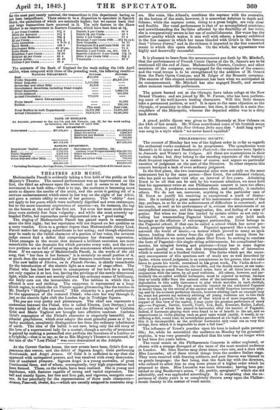THEATRES AND MUSIC.
Mademoiselle Parodi is evidently taking a firm hold of the public at Her Majesty's Theatre. The second performance was an improvement on the first, the third an advance upon the second; and it seems to us that the movement is on both sides,—that is to say, the audience is becoming more acute to discern the merits of the artist, and the artist is getting rid of a nervous embarrassment which stood in her way on the night of her &bat, and gave a certain oddity to some of her gestures. This "oddity" does not apply to her poses, which were uniformly dignified and even statuesque, but to the more transient expressions of emotion—as, for instance, the tap on the bosom at the end of the first act. Yet even her most crude transi- tions were entirely free from vulgarity; and while she most severely up- braided Pollio, her reproaches never degenerated into a "good rating.'
The singing of Mademoiselle Parodi has gained much in smoothness since the first night; but her reputation will not depend on her qualities as a mere vocalist. Even to a greater degree than Mademoiselle Jenny Lind, Parodi makes her singing subordinate to her acting; and though objections may be made to the veiled character of a portion of her voice, the severest judge cannot find a defect that compromises her dramatic expression. Those passages in the music that demand a brilliant execution are most remarkable for the dramatic fire which pervades every note, and the sotto voce portions are as full of meaning as the countenance which accompanies them. If we cannot say of Mademoiselle Parodi, in the words of the old song, that "her face is her fortune," it is certainly no small portion of it, so much does the natural mobility of her features contribute to her power.
The new ballet of Electra, on la Pleiade Perdue, is chiefly remarkable for the introduction of the electric light as a means of stage-effect. The Pkiad who has lost her lustre in consequence of her love for a mortal, not only regains it at last, but, having the privilege of the newly-discovered light, while her sisters are merely allowed the ordinary means of brilliancy, she fairly cuts out the immaculate six. The tableau in which this is effected is new and striking. The empyrean is represented as a hazy bluish region, in which the six Pleiads appear glimmering like the torches in Mr. Danby's "Highland Funeral." This obscurity is a good preliminary for the appearance of the restored Pleiad; who cuts her way through it, Just as the electric light cleft the London fogs in Trafalgar Square.
The pas are very pretty and picturesque. The chief one represents a contention between the Pleiad, who is called Electra, (not Sterope,) and the mortal bride of the man she loves; and the different styles of Carlotta Grin and Marie Taglioni are brought into effective contrast. Carlotta Grisi's conception of the Pleiad's character is singularly beautiful. An etherial playfulness, which ever adopts the most graceful poses as if by a lucky accident, completely distinguishes her from the ordinary inhabitants of earth. The idea of the ballet is not new, being only the old story of the love of a supernatural lady for a mortal; though a novelty of treatment 18 gained by making a personified star perform the functions of a Lurline or a Sylphide,—that is to say, as far as Her Majesty's Theatre is concerned, for the tale of the " Lost Pkiad " was once dramatized at the Adelphi.


























 Previous page
Previous page